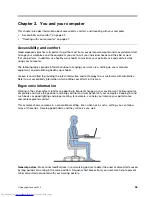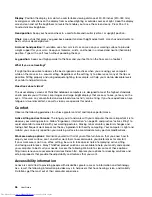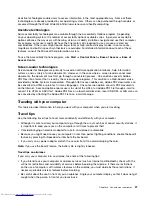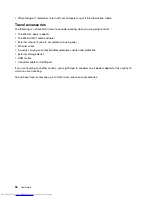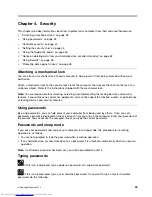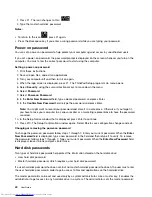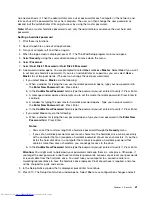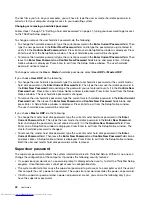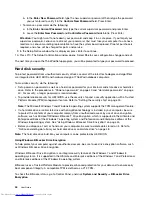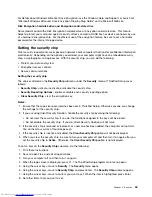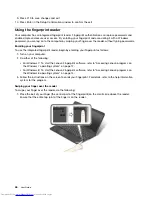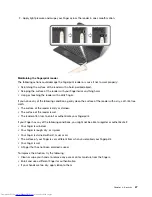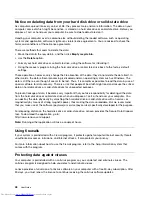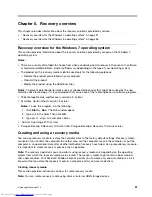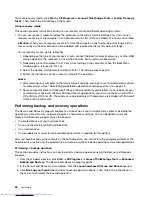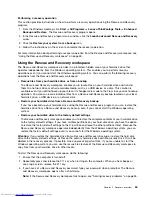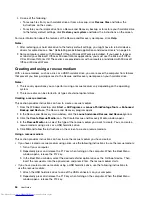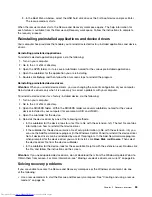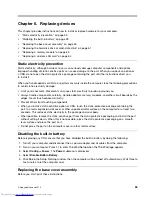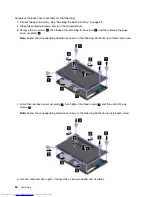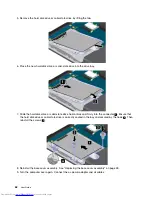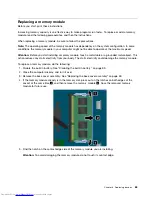
Notice on deleting data from your hard disk drive or solid-state drive
As computers spread into every corner of life, they process more and more information. The data on your
computer, some of which might be sensitive, is stored on a hard disk drive or solid-state drive. Before you
dispose of, sell, or hand over your computer, be sure to delete data stored on it.
Handing your computer over to someone else without deleting the loaded software, such as operating
systems and application software, might even violate license agreements. You are advised to check the
terms and conditions of those license agreements.
There are methods that seem to delete the data:
• Move the data to the recycle bin, and then click
Empty recycle bin
.
• Use the
Delete
option.
• Format your hard disk drive or solid-state drive, using the software for initializing it.
• Using the recovery program, bring the hard disk drive or solid-state drive back to the factory default
settings.
These operations, however, only change the file allocation of the data; they do not delete the data itself. In
other words, the data retrieval processing is disabled under an operating system such as Windows. The
data is still there, even though it seems to be lost. Thus, it is sometimes possible to read the data by use of
special software for data recovery. There is a risk that people of bad faith might read and misuse the critical
data on hard disk drives or solid-state drives for unexpected purposes.
To prevent leakage of data, it becomes very important that you take responsibility for deleting all the data
from the hard disk drive or solid-state drive when you dispose of, sell, or hand over your computer. You
can destroy the data physically by smashing the hard disk drive or solid-state drive with a hammer, or
magnetically by means of strong magnetic power, thus making the data unreadable. But we recommend
that you make use of the software (payware) or service (pay service) specifically developed for the purpose.
For disposing of data on the hard disk drive or solid-state drive, Lenovo provides the Secure Data Disposal
tool. To download the application, go to:
http://www.lenovo.com/support
Note:
Running either application will take a couple of hours.
Using firewalls
If your system is preinstalled with a firewall program, it protects against computer Internet security threats,
unauthorized accesses, intrusions, and Internet attacks. It also protects your privacy.
For more information about how to use the firewall program, refer to the help information system that
comes with the program.
Protecting data against viruses
Your computer is preinstalled with an antivirus program so you can detect and eliminate viruses. The
antivirus program is designed to help you detect and eliminate viruses.
Lenovo provides a full version of antivirus software on your computer with a free 30-day subscription. After
30 days, you must renew the license to continue receiving the antivirus software updates.
48
User Guide
Summary of Contents for ThinkPad S531
Page 1: ...User Guide ThinkPad S531 ...
Page 6: ...iv User Guide ...
Page 16: ...xiv User Guide ...
Page 66: ...50 User Guide ...
Page 74: ...58 User Guide ...
Page 106: ...90 User Guide ...
Page 124: ...108 User Guide ...
Page 134: ...118 User Guide ...
Page 138: ...122 User Guide ...
Page 145: ...Appendix F Eurasian compliance mark Copyright Lenovo 2013 129 ...
Page 146: ...130 User Guide ...
Page 147: ......
Page 148: ......


